Real Fashion For The Era Of Fake Trends
Fear of God’s first collection in almost two years is clothing for life, not a social media algorithm.
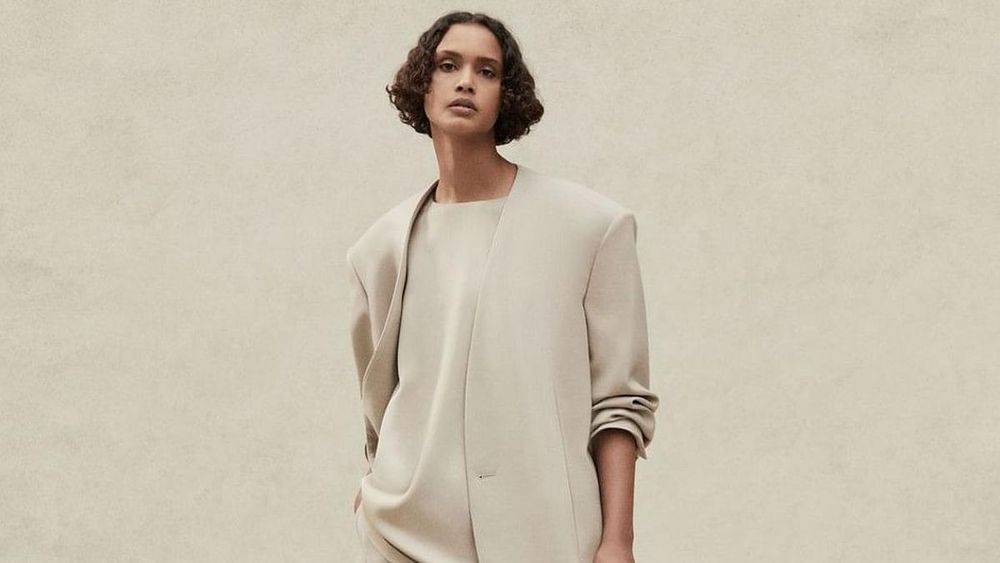
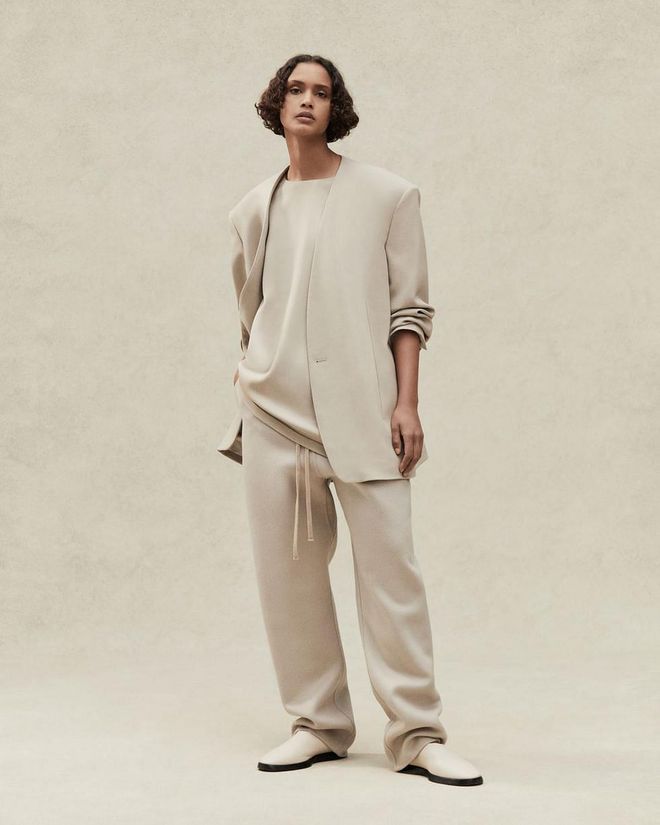
Photo: PIERRE TOUSSAINT
Fear of God 'Eternal'
Lately I wonder if we’re living through a mass psychosis expressing itself through trend reporting. If it felt a year ago like anything goes—that the restrictions and trauma of the pandemic highlighted fashion and self-expression as a new outlet for freedom—increasingly it seems that there are a thousand trends happening at once. In just the past month, I have read stories about a new twist on the girlboss trend called “that girl,” a trend in which women really enjoy themselves, and a trend in which women enjoy themselves a little, plus “dinocore,” “clowncore,” and “twee.”
On TikTok, trend forecasting has become the new influencer hustle, almost a trend itself; creators who can string together photographic evidence with a pithy and compelling monologue are performing a kind of competitive prophecy. And the platform’s algorithm seems to favor this sort of information sharing: the more ridiculous the prediction, the more traction it gains, and the more predictions we are fed. In the meantime, fast fashion brands like Shein have sped production to such a pace that they can both predict and reflect these trends, making them feel all the more real while we ping pong through “feels” and “vibes” with no aesthetic compass.
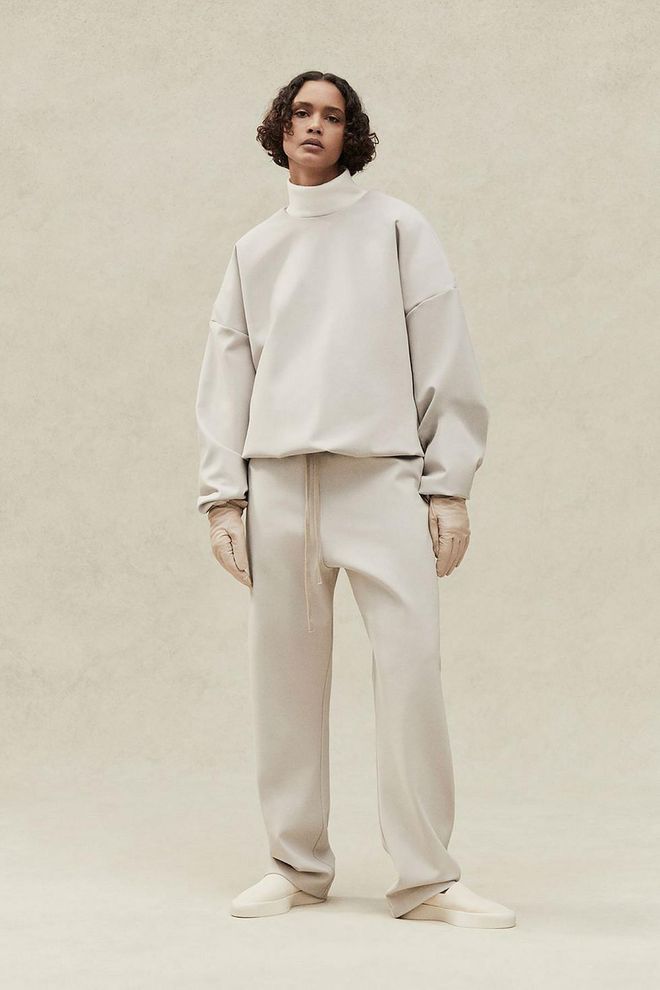
Photo: Courtesy
Fear of God 'Eternal'
Even runway fashion, which is supposed to move at a slower, biannual speed, has joined this rat race, as designers pack their shows with potential viral moments and styles that are replicable by anyone with a little ingenuity and a pair of scissors. The tempo of fashion makes everything feel quick, carefree, and, sometimes, unfortunately, even careless. Mostly it seems that people are doing things humans have done for most of the past century—relaxing, working hard, having martinis, not having martinis—but now we cannot resist the urge to package them into something that feels more meaningful than mere consumer choices.
Jerry Lorenzo, the 44-year-old designer behind the brand Fear of God, is a man who has started many trends himself (real trends, that is). When he began his brand almost a decade ago, it was a luxury cornerstone of the hypebeast movement, which often encourages a cut-throat, product-driven style of consumerism. Lorenzo worked on an early season of Yeezy alongside then-Vetements designer Demna, and, after making T-shirts for Justin Bieber’s “Purpose” tour, helped turn merch into meaningful clothes. He was a close friend of and collaborator with the late Virgil Abloh, whose brand Off-White propelled streetwear to the forefront of fashion, and his sneakers and sweatpants remain staples in hip corridors of Los Angeles and New York.
Related article: Fear of God Is Getting Into Womenswear, At Last
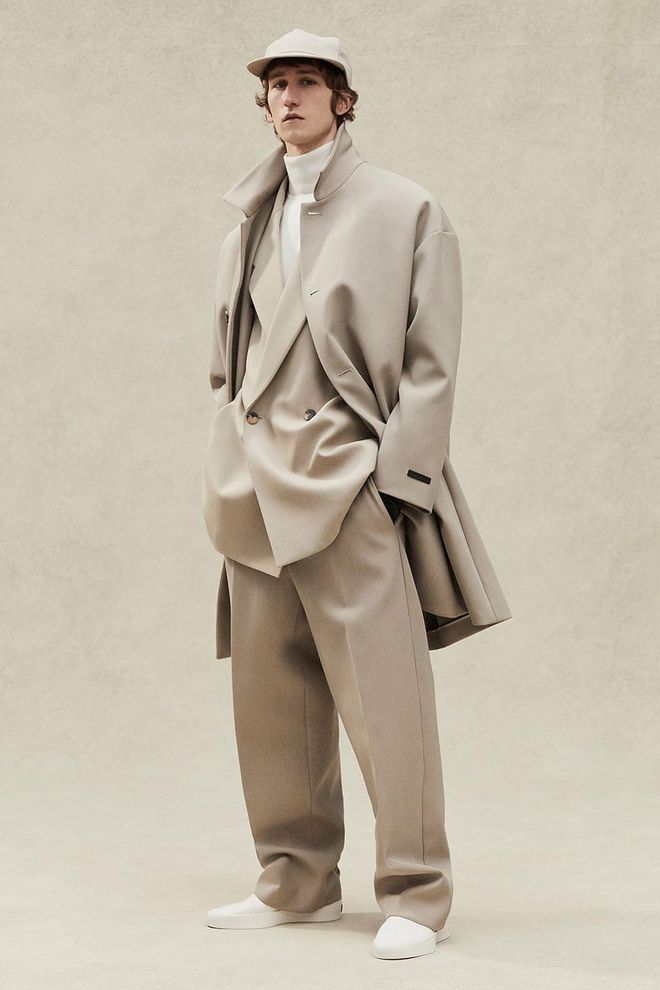
Photo: Courtesy
Fear of God 'Eternal'
But lately, Lorenzo has been on a different kind of fashion journey. In early 2020 he collaborated with Ermenegildo Zegna’s Alessandro Sartori for a collection that shifted menswear’s inner circle’s attitude around suiting, making it feel less performative and more like a staple. And now his collections, which arrive on his own time rather than seasonally, serve a slower, even higher purpose. Today, he is releasing a new collection, his first in nearly two years. As he worked on it, he said in a video interview late last week, he asked himself of every garment, “Is this timeless?”
“I do feel inundated with trends and color and graphics and so much of now,” he said. “And I want to provide a safe space for someone that wants to step outside of that, but can still step into that conversation with everyone else that’s of ‘the now’ and feel of ‘the now,’ but not have to be so on trend.”
Instead, what he wants his clothing to do is help his customers “feel the confidence. I want them to feel sophisticated, but I want them to feel the freedom to be themselves and know that it’s not the trend that validates you. It’s the individual that you are.”
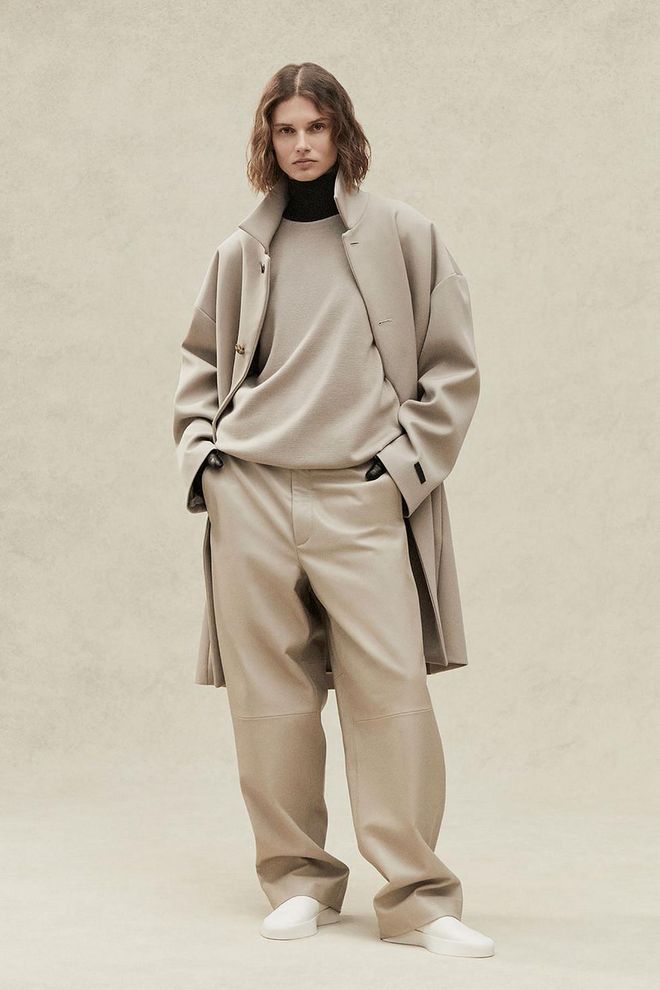
Photo: Courtesy
Fear of God 'Eternal'
Lorenzo calls this collection Eternal. And while the clothing is a natural progression of the easy elegance of the collections he dropped in late summer and fall of 2020, it seems quite radical, to me, to proclaim you want to defy the trend cycle and try to make something that has lasting value. It seems so obvious, to try to float above it all, and yet the intoxicating quest for relevance has made it a rare impulse.
Lorenzo is almost dipping into the realm of slow fashion—of designers with far less recognizable names who rarely stage fashion shows, like the 19th-century inspired work of Paul Harnden, the simple French cottons of Casey Casey, or the heady beauty of Elena Dawson. They make clothing that is intentionally hard to find and difficult to make. Lorenzo hasn’t gone that far, of course, and he has in his corner the fact that his clothing is meant to make you feel as comfortable in a suit as you are in your favorite sweatshirt. That means it has the potential to transcend the cognoscenti customer of slow fashion brands, or perhaps convert recovering hypebeasts into cognoscenti. He is designing with incredible thoughtfulness, even integrity–almost like a novel.
Related article: Jerry Lorenzo’s Fear of God Is More Than Just Menswear
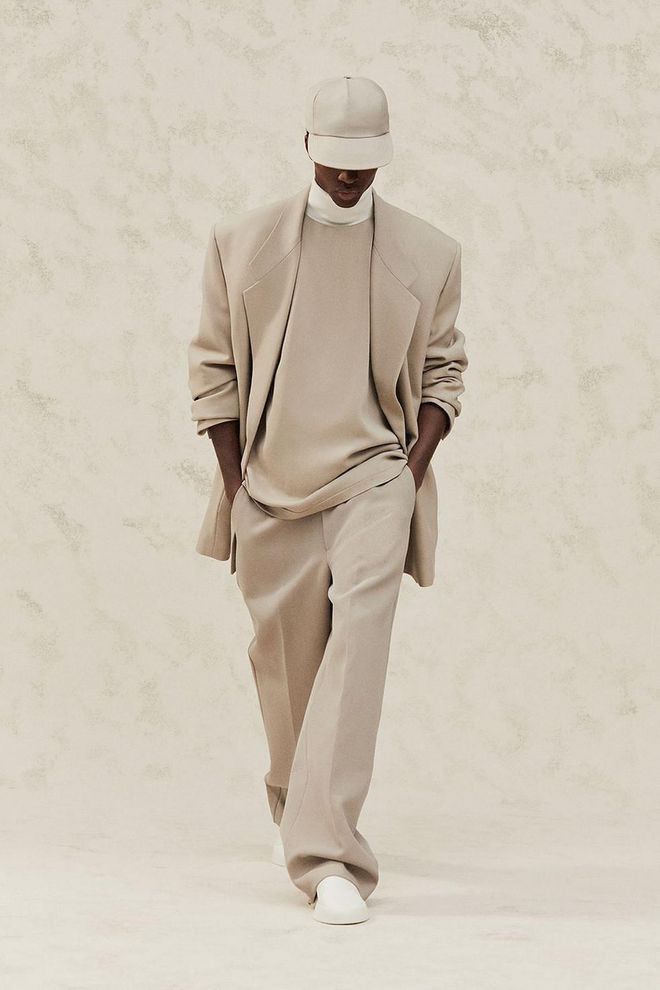
Photo: Courtesy
Fear of God 'Eternal'
“I approach it like a book or a music album,” said Lorenzo of putting together collections. “I don't really approach it in terms of seasons and seasonality. I approach it like, Hey, do I have something to say? Do I have the resources to say what I wanna say in the best way?” He remains independently owned–he also has a partnership with Adidas, where he serves as the head of strategy for their basketball category—and his resources are just catching up to his point of view, as he put it. He’s been able to move 80% of his production to Italy, for example. “And so hopefully each time we have something to say, it�’s better than the last thing we said.”
Lorenzo, of course, isn’t the only designer to prize continual improvement over novelty. The Row’s Ashley and Mary Kate Olsen come to mind, and Lorenzo, like The Row and other influential American aesthetes, is particularly drawn, lately, to the 1980s and ’90s designs of Giorgio Armani. His cascades of beige in flowing, almost spiritually understated cuts wrote a new script for minimalism. If Prada was cerebral, edgy, and obscure, and Calvin Klein was sexy, Armani was, just as Lorenzo said, a man of confidence, whose clothing blessed its wearers with a feeling of monastic chic weightlessness.
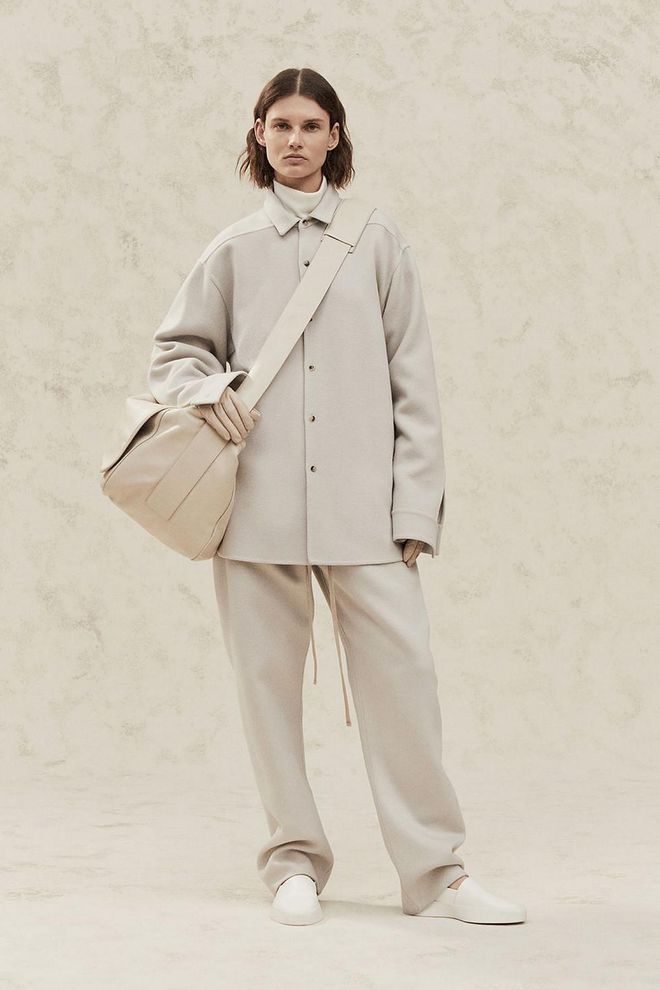
Photo: Courtesy
Fear of God 'Eternal'
In Eternal, the cuts are generous without swamping their wearer in fabric; the tones are bones, milky beiges, and greyish whites; and nearly all the pants blur the line between a structured trouser and a cozy sweatpant. You can see how a person dressed in these clothes might calm a room of investors or subtly change the energy in a coffee shop line. “I am in fashion, and I do love to present myself a certain way,” Lorenzo mused. “But that’s always been something that is understated. It’s always been something that isn’t loud and doesn’t call for attention. As quiet as I want to be in a room, I also want to be competent, you know?”
Like Armani—and again, like The Row—Lorenzo is thinking about how his clothing might provide solutions, not only to the holes in your wardrobe but to your own questions about your sense of self. How do you wear a suit, which has different proportions and fabrics than a hoodie or track pants, and still feel like yourself? “That’s what I’m always chasing, you know? How can I be always sophisticated in the way that I present myself, but honest, and relaxed and comfortable?”
Related article: JW Anderson Is Over The Runway, And He’s Getting Creative Instead
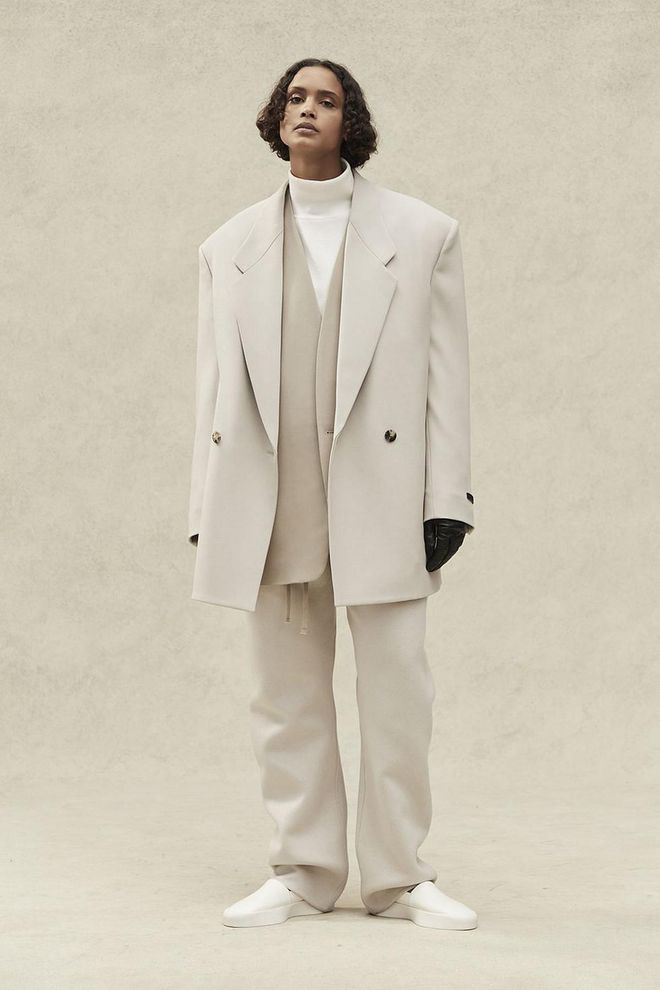
Photo: Courtesy
Fear of God 'Eternal'
Lorenzo’s evolution as a designer over the past decade, from a Los Angeles DJ to a new hero in intentional clothing creation, has been one of fashion’s most interesting. By staying independent, he’s allowed himself the time to grow and explore that investors or big luxury house appointments rarely afford. Too often, a designer’s references are too readily apparent, too surface—Ralph Lauren’s Polo line, or Annie Leibowitz’s images for The Gap, or the wackadoo spirit of 1980s couture that seems to have captured the imagination of many young womenswear designers in New York. In fact, prior to his dalliance with Zegna, Lorenzo spoke about wanting to build a brand like Lauren’s. But Lorenzo has a new modesty about him, and his clothing feels intimate in a way that Lauren’s, which is much more like a worshipful encyclopedia of American style, simply cannot.
We talked about how opting out of trendiness can be quite boring—depending on how many viscose trouser-wearing influencers you follow on Instagram, you might say it’s even something of a trend itself—and how he’s tweaked his pieces, and played with fabrics, to give his pieces some heart and some personality. Changing the shoulder on a jacket from a past collection to make it feel less 1980s, for example. The result is that these are real clothes, for someone who is not trying to create a look for a moment in time, but who believes fashion can improve your life in small but significant ways.
This article originally appeared on Harper's BAZAAR US.